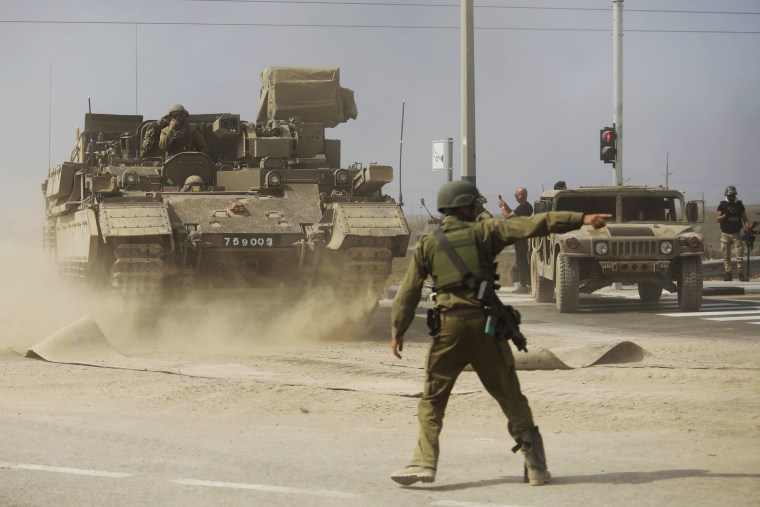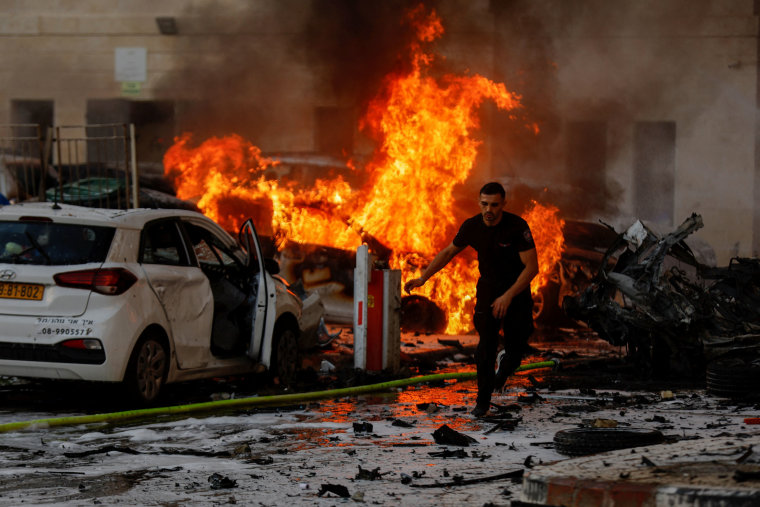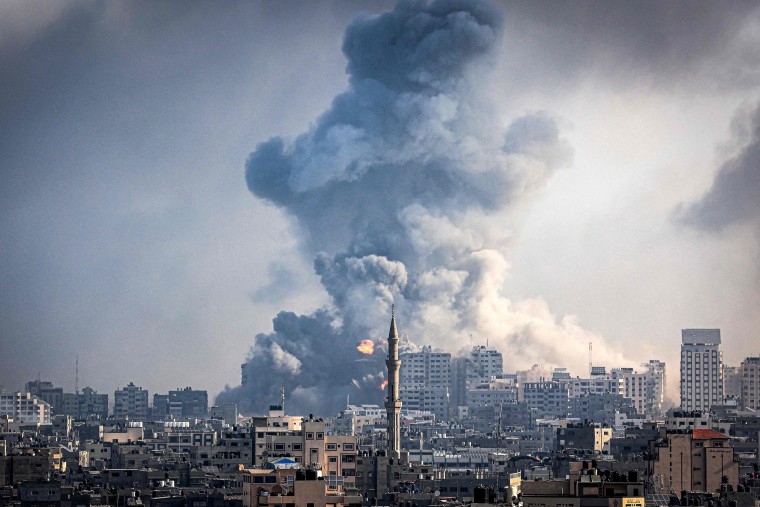What are the ‘laws of war’? When did the term first appear?
The “laws of war,” also called International Humanitarian Law, refer to a group of statutes agreed upon in international conventions and treaties over the last 150 years. A series of treaties, known as the Geneva Conventions, were adopted in 1864, 1906, 1929 and 1949 to limit “the barbarity of war,” according to the International Committee of the Red Cross. The Additional Protocols of 1977, the Hague Conventions of 1899 and 1907, as well as conventional weapons conventions, are also part of International Humanitarian Law, also known as IHL.
The overriding goal of IHL is to protect civilians by restricting the actions of military forces. They are designed to protect people who do not take part in the fighting, such as civilians, medics and aid workers, as well as those who can no longer fight, such as wounded and sick combatants, and prisoners of war.
In the wake of World War II and the Holocaust, all 196 members of the newly created United Nations adopted the four original Geneva Conventions, making them one of the world’s most widely agreed upon international agreements.
There are five basic principles under International Humanitarian Law: military actions must be necessary; they must distinguish between civilians and legitimate military targets; they must be proportionate, meaning they must avoid to the extent possible incidental harm; they must avoid unnecessary suffering, sometimes referred to as humanity; and, finally, the actions taken by the military must be honorable.

The International Committee of the Red Cross, a global nonprofit based in Switzerland, is an independent, neutral organization that works to ensure “humanitarian protection and assistance for victims of armed conflict and other situations of violence.” Known as the ICRC, its mandate and mission is to take “action in response to emergencies” and promote “respect for international humanitarian law and its implementation in national law.” The ICRC can investigate allegations of war crimes, but on its own has no power to prosecute them.
“Humanitarian law does not regulate when and if wars are justified or when they can start or end,” said Ilia Utmelidze, director of the Case Matrix Network, a nonprofit group that investigates war crimes. “It is a minimum standard of protection when wars are fought.”
Who prosecutes people or nations accused of committing war crimes?
All signatories to the Geneva Convention are obligated to investigate and prosecute war crimes domestically if they are aware of them. But the decisions are often wrapped in politics. “Bottom line, we have the jurisprudence, the experience and the rules of procedure and evidence to prosecute those who commit war crimes,” said David Crane, an American international law expert and the founding chief prosecutor of the United Nations’ Special Court for Sierra Leone. “But the bright red thread about whether a international tribunal is convened is political, not legal.”
Crane pointed out that, nevertheless, international tribunals have been convened to prosecute war crimes in Rwanda, Sierra Leone and the former Yugoslavia, where war crimes occurred.
In 1989, an effort was launched to create an International Criminal Court that would prosecute war crimes globally. The citizens or soldiers of any nation that signed a treaty known as the Rome Statute could be investigated and tried by the court for committing war crimes if such crimes are committed on the territory of this country.
All told, 123 nations have signed the Rome Statute, including the "State of Palestine," the U.K., France, Germany and Japan. Dozens of nations, including the United States, Russia, China and Israel, have declined to ratify the Rome accord. They cite fears of bias by the court and argue that their own national military justice and legal systems are already adequately prosecuting war crimes.
For some time now, a United Nations Commission of Inquiry has been “collecting and preserving evidence of war crimes committed by all sides” of the Israel-Palestinian conflict, according to The Associated Press. That evidence could be added to an ongoing investigation by the International Criminal Court into possible war crimes by Israel and Hamas in past conflicts.

As part of its Oct. 7 attack on Israel, Hamas fired on Israeli military posts on its border with Gaza. Is that a war crime?
Experts on the laws of war say that attacks on military posts are generally not war crimes. While the decision by Hamas to attack Israel can be condemned and criticized as “wrong,” it does not in itself violate the rules of war. “As a military, you get a license to kill,” said Utmelidze, from Case Matrix Network, “but you have to be prepared to pay with military lives of your own.”
Hamas attacked Israeli villages and a musical festival, taking hostages and killing civilians. Are those actions war crimes?
It is “indisputable” that Hamas committed war crimes in their brutal attack on Israeli citizens, according to David Scheffer, one of the foremost experts on the laws of war. Scheffer, a senior fellow at the Council on Foreign Relations, was the first ever U.S. ambassador at large for war crimes issues during the Clinton administration.
Scheffer noted that since Gaza and the West Bank are signatories to the ICC, it is possible that both Hamas and the individuals accused of committing “crimes against humanity” could face prosecution at The Hague.
“Intentional targeting of civilians and civilian objects without a military necessary reason to do so is a war crime, period,” said Crane, the international law expert. “And that’s a standard that both sides are held to under international law.”
Experts told NBC News that one of the central determinants in assessing whether war crimes have been committed is if the actions were intentional and without military purpose. Furthermore, they say, the mutilation of bodies, torture and hostage-taking are all considered war crimes.
On Oct. 8, Israel cut off food, fuel, water and electricity to all of Gaza’s 2.2 million people. More than half of them are children. Is that a war crime?
Crane said that, while blockades are legal, the nation imposing the blockade must take into consideration the effect on the civilian population. “There is no bright line,” he said, “but we will know when it has gone too far.”
Scheffer said, “It is an acceptable short-term tactic,” but “clearly it cannot be of a long duration.”
On Monday, the World Health Organization warned there were only “24 hours of water, electricity and fuel left” in the Gaza Strip before “a real catastrophe” occurred. On Wednesday, Imene Trabelsi, a spokesperson for the ICRC, told NBC News that the water situation in Gaza is “near catastrophic.”
The Israeli air force has reportedly dropped more than 6,000 bombs over Gaza since Oct 7. Is that a war crime?
The Israeli military is allowed to eliminate the Hamas threat, said Scheffer, but must do so in ways that protect Palestinian civilian lives and ultimately gives them the right to return to their homes.
“As Israel seeks out military targets and strikes them from the air, or engages them from the ground, it will always have to balance the safety and well-being of the civilian population with the military objective of eliminating Hamas,” Scheffer said. “It’s a calculation that must be made in wartime.”

Crane said that “Israel is in an impossible situation. It appears Israel is trying to follow the Geneva Convention and the law of armed conflict but, because the battlefield is one of the most densely populated areas on earth, and because Hamas has a history of hiding behind civilians, protecting the Palestinian people will be complex and civilian lives will be lost.”
Scheffer said Israel needs “to tread carefully” taking into account the “guardrails that exist” to protect civilians in Gaza. The laws of war can be “complex,” Scheffer conceded, but certain principles are crystal clear, for example, “atrocities committed by Hamas do not permit Israel to commit atrocities in return.”
Are attacks on hospitals and schools war crimes?
On Tuesday, a massive explosion destroyed Al-Ahli Hospital in central Gaza. Palestinian Health Ministry officials said it killed hundreds of civilians. Targeting hospitals is specifically outlawed under the first Geneva Convention. But even the protection of hospitals is not absolute. If hospitals are “used to commit … acts harmful to the enemy,” then attacks on them may be permitted so long as they follow the rules of proportionality and precaution.
The Israeli Defense Forces say it does not target hospitals and have offered evidence that the tragedy was the result of a misfired rocket launched by the Palestinian militant group Islamic Jihad. U.S. intelligence officials have also assessed that Israel did not cause the blast. Since Oct. 7, the World Health Organization has reported 41 attacks on health care facilities and 74 attacks on ambulances or other medical transport vehicles in Gaza.
On Tuesday, a U.N.-run school in northern Gaza was hit and six people were reportedly killed. Like hospitals, schools are civilian facilities and cannot be attacked, unless enemy combatants use the school as a base for attack. But even then, the attack must be proportionate. In other words, according to the IHL, if only a few combatants are inside, a small special forces team might be used for an attack, but demolishing the school with a large bomb would be disproportionate.
“Israel knows it will be under close scrutiny,” said Scheffer. “Israel must be able to defend itself without abandoning its own principles. If it fails to do so, it may find itself in a militarily superior position but ostracized on a risky perch.”
